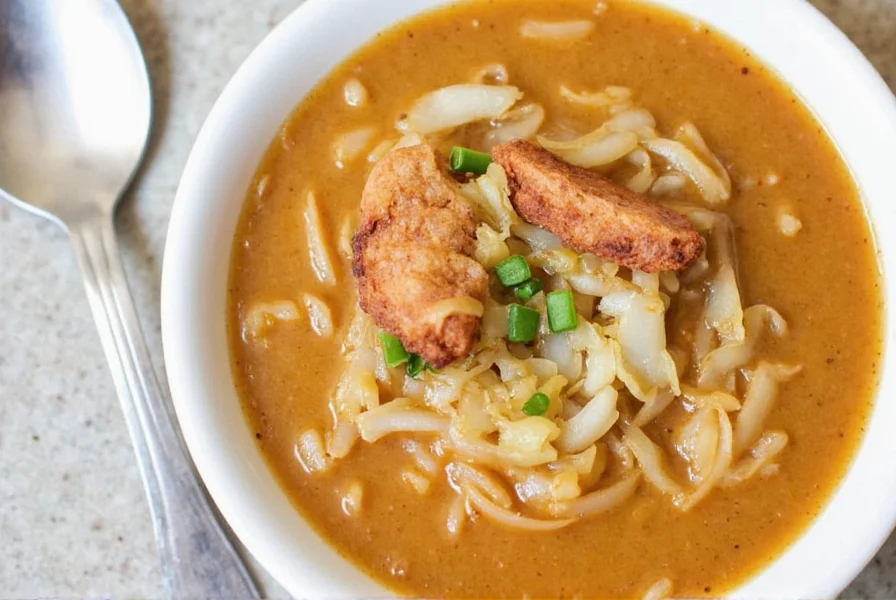Introduction
French onion soup is a classic French dish known for its rich, savory flavor and comforting qualities. The key to an authentic French onion soup lies in the proper use of spices that enhance the natural sweetness of caramelized onions and create a balanced, aromatic broth. This guide covers the essential spices for French onion soup, how to use them effectively, and where to find high-quality ingredients to elevate your recipe.

Understanding Spice Roles in French Onion Soup
Spices in French onion soup serve specific functions: they balance sweetness, add depth, and create aromatic complexity. Unlike many soups, French onion soup relies on subtle spice combinations rather than bold flavors. The right spices should complement the caramelized onions and beef broth without overpowering them.
Essential Spices for Authentic French Onion Soup
Traditional French onion soup uses a minimal spice palette to highlight the onions and broth. Here are the essential spices:
- Thyme: Fresh thyme is preferred for its delicate, earthy flavor that complements onions without dominating. Use 2-3 sprigs per pot.
- Bay Leaves: 1-2 dried bay leaves provide subtle herbal notes. Remove before serving.
- Black Pepper: Freshly ground black pepper adds gentle heat and complexity. Use 1/2 teaspoon for 4-6 servings.
- Salt: Essential for balancing flavors. Use sea salt or kosher salt for best results.
- Nutmeg: A tiny pinch (1/8 teaspoon) adds warmth without sweetness. Freshly grated is best.
These five spices form the foundation of authentic French onion soup. Additional spices like garlic or cinnamon are optional and not traditional in classic recipes.
Pro Tips for Using French Onion Soup Spices
| Spice | When to Add | Quantity for 4-6 Servings | Preparation Tip |
|---|---|---|---|
| Thyme | During onion caramelization | 2-3 fresh sprigs | Remove stems before adding; tie in a bundle for easy removal |
| Bay Leaves | When adding broth | 1-2 dried leaves | Remove after 30-45 minutes of simmering |
| Black Pepper | At the end of cooking | 1/2 teaspoon freshly ground | Always grind fresh for maximum flavor |
| Salt | Gradually during cooking | To taste | Add in stages and taste between additions |
| Nutmeg | During simmering | 1/8 teaspoon freshly grated | Use a microplane for best results |
Additional tips:
- Never use pre-ground nutmeg - it loses potency quickly
- For authentic French flavor, avoid garlic and cinnamon in traditional recipes
- Use fresh thyme rather than dried for optimal flavor
- Toast bay leaves briefly before adding to enhance their aroma
Where to Buy Quality Spices for French Onion Soup
For the best results, source high-quality spices from reputable suppliers. Here are top recommendations:
| Spice | Recommended Brand | Why It's Best | Where to Buy |
|---|---|---|---|
| Thyme | Frontier Co-op Organic | Organic, fresh, and sustainably sourced | Natural food stores, Amazon |
| Bay Leaves | McCormick Gourmet Collection | Consistent quality and strong aroma | Supermarkets, online retailers |
| Black Pepper | Penzeys Whole Peppercorns | Whole peppercorns ground fresh for maximum flavor | Penzeys website, specialty stores |
| Nutmeg | Spicely Organics | Freshly ground organic nutmeg | Health food stores, online |
Important: Avoid spice blends or pre-mixed French onion soup seasonings. Authentic French onion soup requires individual spices to control flavor balance precisely.
Frequently Asked Questions
What are the most essential spices for authentic French onion soup?
The most essential spices for authentic French onion soup are thyme, bay leaves, black pepper, salt, and nutmeg. Traditional French recipes use only these five spices to highlight the caramelized onions and beef broth without overpowering them. Garlic and cinnamon are not part of the classic recipe.
Can I use garlic in French onion soup?
Traditional French onion soup does not include garlic. While some modern variations add garlic, it's not authentic. Garlic can overpower the delicate onion flavor that defines this dish. If you choose to use garlic, add only 1-2 cloves and sauté with the onions.
Why is nutmeg used in French onion soup?
Nutmeg adds a subtle warmth that complements the sweetness of caramelized onions without adding sweetness itself. It's used in very small quantities (1/8 teaspoon per pot) to enhance the overall flavor profile. Freshly grated nutmeg is essential - pre-ground loses potency quickly.
Should I use fresh or dried thyme?
Fresh thyme is preferred for French onion soup as it provides a brighter, more vibrant flavor. If using dried thyme, use half the amount (1 teaspoon dried for every 2-3 sprigs fresh). Tie fresh thyme sprigs together with kitchen twine for easy removal after cooking.
What's the difference between French onion soup and regular onion soup?
French onion soup specifically refers to the classic French preparation with beef broth, caramelized onions, and a minimal spice palette (thyme, bay leaves, pepper, salt, nutmeg). Regular onion soup may use different broths and additional spices. Authentic French onion soup requires specific techniques like slow caramelization and proper broth selection.
Conclusion
Mastering French onion soup comes down to understanding the precise role of each spice. The traditional French recipe uses only five essential spices to highlight the natural flavors of caramelized onions and rich beef broth. By using fresh, high-quality spices and following proper techniques, you can create an authentic French onion soup that's both comforting and sophisticated.
Remember: less is more with French onion soup spices. Avoid adding unnecessary ingredients that might overwhelm the delicate balance of flavors that make this dish so special.










 浙公网安备
33010002000092号
浙公网安备
33010002000092号 浙B2-20120091-4
浙B2-20120091-4